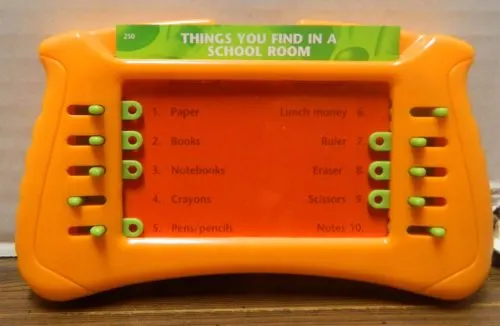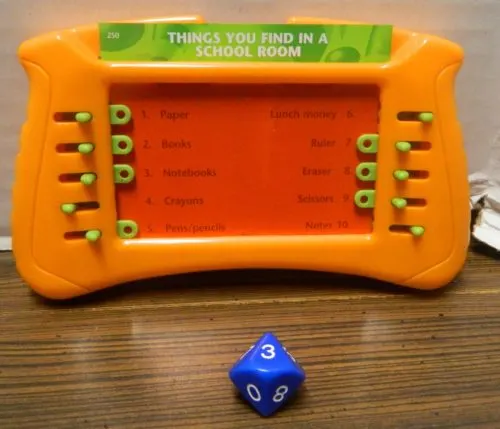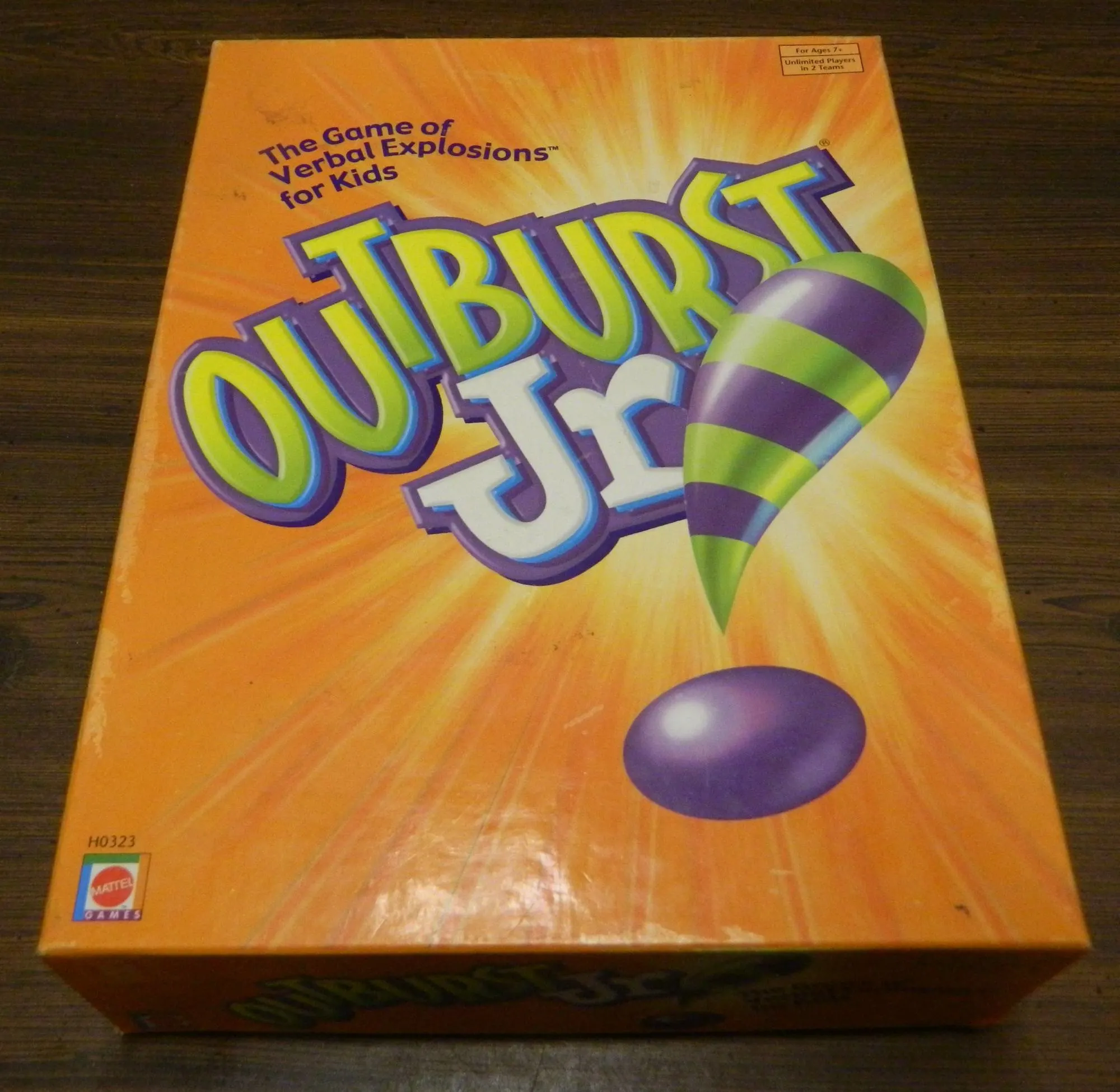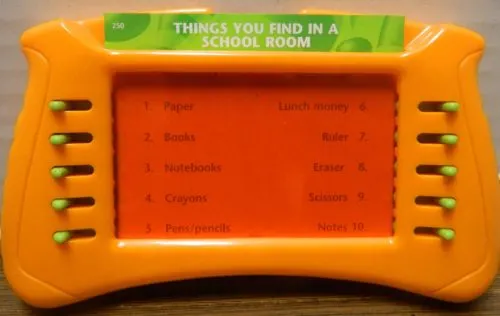Released back in 1986 Outburst is one of the more popular mainstream party games of all time. Normal Outburst alone has had six different versions released in the United States. There have also been eight spinoff Outburst titles. Being such a popular party game it is actually kind of surprising that I had never played the game before. Despite being a popular game I had never felt the need to pick up the game. After waiting so long though I finally decided to give the game a chance. While Outburst has some issues it is hard to deny that it is a fun party game.
How to Play Outburst
Setup
The players separate into two teams and choose a playing piece. Each team rolls the die to see who gets to play first.
Playing the Game
A player from the opposite team acts as the scorekeeper for the round. They take a card and slide it into the viewer. The player makes sure all of the answers are unchecked. The player looking at the card reads off the category and then turns over the timer.
The current team will have one minute to yell out as many answers that fit the category as they can think up. Each time a player says one of the words on the card the player checking the answers says “yes” and they use the button on the viewer to indicate that the answer was given.
When the timer runs out the players can’t give any other answers. The scorekeeper reads off the answers that the other team didn’t give. If the other team claims they said the word they get credit for it. The current team will score one point for each correct word given.

The round has ended and the team successfully provided seven of the answers so they will score seven points.
Then a player from the current team rolls the die. If the team provided the word that corresponds to the number rolled, the team scores an additional three points.

The current team rolled a three and they successfully provided the third answer. This team would receive three bonus points.
Winning the Game
The game ends when one of the teams have earned the required amount of points to win the game.
My Thoughts on Outburst
So I would like to start out this review by saying that this review is technically based on the 2004 version of Outburst Junior. Despite playing Outburst Junior this review is going to cover both Outburst and Outburst Junior. I think this is fair because the only real difference between the two games are the cards. The gameplay itself is exactly the same in both versions of the game so I didn’t really see the point in reviewing Outburst and Outburst Junior individually.
While a lot of people are probably already familiar with Outburst, for those unfamiliar with the game I would classify it as speed Family Feud. In each round a team is given a category and has one minute to try and guess 10 words/things associated with that category. I compare this to the Family Feud game show since on the show teams try to provide the most popular answers for a given question.
Being considered a pretty popular party game I have to say that it is kind of odd that I had never played Outburst until recently. I honestly don’t know why I had never played the game since it has all the makings of a good party game. The game is quick and easy to play. It offers plenty of excitement as players race to yell out as many answers as they can in under a minute. Where I think Outburst shines the most is that it usually gives you questions that are broad enough that every team should be able to get at least four or five answers but it usually takes quite a bit of skill to get all of the answers for a given round.
It is kind of hard to explain why but Outburst is simply a fun game. The excitement of trying to give as many answers as quickly as possible is infectious. The game works well with any audience as the rules are easy to pick up and the topics on most of the cards are generic enough that everyone should be able to contribute. While I only played the game with four players I can see it being a game that will be more engaging with more players. While each game is pretty short it is pretty hard not to want to play another game.
Outburst is a surprisingly fun party game but it does have some problems.
Probably the biggest problem with the Outburst series are the cards themselves. The problem with the cards is that the topics can become outdated quite quickly. The reason the cards become outdated so quickly is that too many of the cards focus on pop culture or things that are time sensitive. For example we played the 2004 version of Outburst Junior and while I wouldn’t consider it to be new it is considerably newer than quite a few of the versions of Outburst. The problem is that even with a 2004 version of the game there are a lot of outdated questions. I can’t imagine how many cards are outdated in the 1980s versions of the game.
For this reason I would probably recommend picking up the newer versions of the game over the older versions. If you do pick up one of the older versions of the game you might have to go through the cards to see which cards are still relevant. Otherwise you probably need to institute a rule that if you draw a card that the other team won’t know many of the answers to you draw a new card. This is especially true if playing with younger players. With how outdated some of the questions from the older versions are, anyone under around 40 would have a hard time getting many of the answers for some of the questions.
The second biggest problem I had with Outburst is that some questions are naturally easier than others. Some questions only have a few potential answers. Others have many potential answers and you have to hope that you guess the right answers to score points. For example a question like “Rhymes with ….” has a limited number of potential answers. Meanwhile a question like “Things you can find in a house” has many more potential answers. This disparity in question difficulty means that a team can lose because they were given more difficult questions. Outburst is not meant to be a serious game so it is not a huge problem. This could be really annoying to people that are really competitive though.
Another potential problem with Outburst comes from the fact that it is really hard for the scorekeeper to keep track of all of the answers given by the other team. With larger teams it will probably be even harder to keep track. This creates a problem when a player doesn’t catch that an answer was given so the other team doesn’t get credit for the answer. This can potentially lead to arguments as the other team claims they gave the answer. With really competitive people I can see this leading to big arguments which could really hurt the game. I wonder if this is why the junior version of the game includes the rule that if the other team claims they gave the answer you just give them credit for it. I think this is a reasonable fix to the problem as if you are so competitive that you are going to lie about providing an answer, Outburst is probably not going to be the right game for you anyway.
The final problem that I had with Outburst is that there are quite a few other games out there that are very similar to Outburst. It is kind of hard to tell if Outburst was the first board game that utilized this mechanic. Outburst took inspiration from things like Family Feud but I don’t know if there was a speed board game released before 1986 that actually used a similar mechanic. I would have to guess that Outburst was probably one of the first games to use this type of mechanic. The problem is that there are quite a few other games that have been released after Outburst that utilize a similar mechanic. While Outburst deserves credit for being released before these games, as far as gameplay it really isn’t better than any of these other games.
As far as the components I can only really comment on the version of the game that I played as the components have changed quite a bit over the past 30 years. One thing that all versions of the game will share are the outdated questions that I mentioned above. Other than the outdated questions I actually liked the components that came with my copy of Outburst Junior. I like that the game obscures the text requiring a red decoder so you can’t accidentally see the answers to a card. The thing I liked the most was that the decoder had buttons that you can press to indicate which answers had already been given. It is such a small addition and yet is a clever addition to the game.
Should You Buy Outburst?
While I have spent considerably more time talking about the negatives of Outburst/Outburst Junior, I still think it is a pretty good party game. The game does have some problems with some of the cards being outdated and some cards being considerably more difficult than others. There is also the potential for fights as people argue about whether an answer was provided or not. None of these faults overshadow the fact that Outburst is a fun game though. The game is an exciting experience as a team tries to yell out as many answers as they can before time runs out. For a party game from 1986 it is pretty impressive that it has held up as well as it has.
If you don’t really care for party games Outburst/Outburst Junior is not going to be for you. If you like party games though and the premise interests you I would recommend looking into Outburst. I would probably recommend picking up one of the newer versions of the game though in order to avoid some of the outdated cards.
If you would like to purchase Outburst you can find it online: Amazon, eBay



Annette Borges
Wednesday 25th of July 2018
Is it possible to get the new decoder? I have two games that are older and hard to read to read the decoder.
Eric Mortensen
Wednesday 25th of July 2018
Probably the easiest way to get the new decoder would be to buy one of the newer versions of Outburst. Outburst is a common game to find at thrift stores and rummage sales. As I believe the cards have changed size/layout over the years, all of the older cards probably won't work with the all of the newer decoders. Otherwise I would guess that any red transparent sheet that you can see through should work as the cards are designed in a way that you have to look through a red transparent sheet in order to make the answers easier to read.